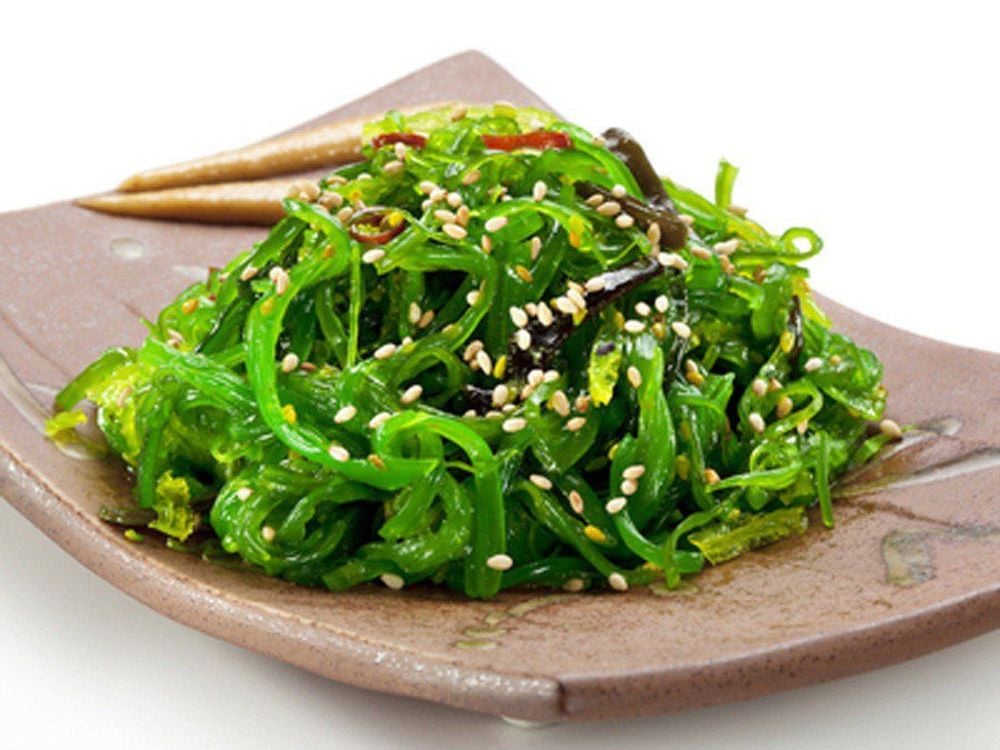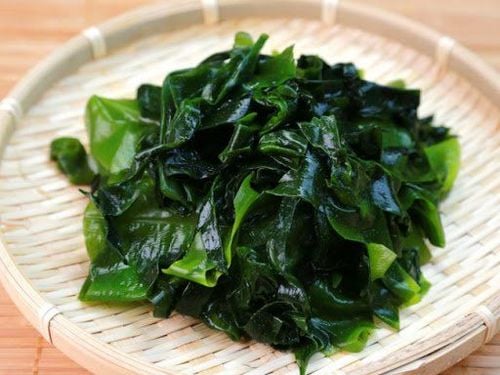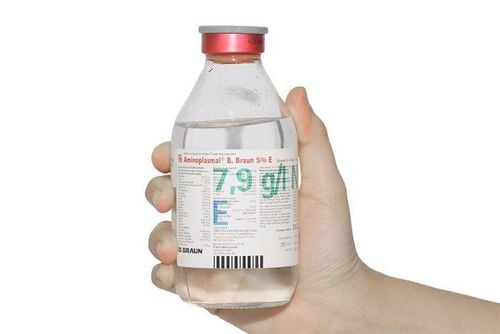This is an automatically translated article.
Seaweed is quite a popular dish for people interested in health. By eating seaweed is known as a super healthy and nutritious way to add more vitamins and minerals to the diet. Regular use of seaweed can promote health and protect the body from a number of diseases.1. Seaweed
Seaweeds that come from the sea can be used, but conversely, those that live in fresh water can be toxic to the body. Usable seaweed will have different colors such as: Red, green, blue - green and brown.Moreover, the size of seaweed is also different. Phytoplankton will be extremely small but with kelp it can grow to 65 meters long, with roots firmly attached to the ocean floor.
Seaweed is not only considered as food for human consumption, but also plays an important role for marine organisms, and is also a major source of food for marine species.
2. Popular types of seaweed
Nori: Belongs to the group of red algae, often used in the form of dry sheets and used to roll sushi. Kelp (brown kelp) is usually prepared by drying it in sheets and added to dishes during cooking. Additionally, kelp can also be used as a gluten-free substitute for wheat flour. There are also some algae belonging to the kelp group such as: Kombu, Arame,... Dulse (red algae) has a softer, tougher texture and is used to add flavor to many dishes. Dulse red algae can also be eaten as a dry snack. Chlorella: Green-green algae that live in freshwater and are often used as a supplement in powder form. Agar and carrageenan: Derived from algae, used as a binder and thickener of plant origin in a variety of food products. Spirulina: Blue freshwater algae, edible and produced in pellets, flakes or powders. However, spirulina is structurally different from other algae.3. Nutritional composition of seaweed
Seaweed belongs to a group of foods that are rich in minerals and trace elements. In the composition of seaweed often contains higher levels of nutrients than most other foods. Therefore, many people consider seaweed as a vegetable of the sea.The nutrient content of seaweed can vary depending on where it lives. Therefore, different types of seaweed will contain different amounts of nutrients. In 100 grams of seaweed often provide:
Calories: 45. Carbs: 10 grams. Protein: 2 grams. Fat: 1 gram. Fiber: 14 - 35% of the RDI. Magnesium: 27 - 180% of the RDI. Vitamin K: 7 - 80% of the RDI. Manganese: 10-70% of the RDI. Iodine: 1- 65% of the RDI. Sodium: 10-70% of the RDI. Calcium: 15-60% of the RDI. Folate: 45 - 50% of the RDI. Potassium: 1 - 45% of the RDI. Iron: 3 – 20% of the RDI. Bronze: 6 – 15% of RDI. In addition, seaweed also contains other nutritional components such as: omega-3 and omega-6 fatty acids, vitamins A, C, E, phosphorus, vitamin B and choline.
Dried algae may contain more nutrients. Just 8 grams of dried algae can provide most of the nutrients listed above.
In spirulina and chlorella contain twice the protein content. The protein composition of these two algae also contains all the essential amino acids needed by the human body and makes them a complete protein source.
Some consider seaweed to be an excellent plant source of vitamins such as vitamin B12, a vitamin found naturally in meat, poultry, eggs, and dairy. Seaweed also provides the body with antioxidants, and also contains high amounts of sulfated polysaccharides (sPS) - beneficial plant compounds believed to contribute to seaweed's health benefits.

Rong biển là loại thực phẩm chứa nhiều khoáng chất
4. Some health benefits of seaweed
4.1. Seaweed can help promote thyroid function in the body In the body, the thyroid gland plays an important role including regulating the body's metabolism. Your thyroid gland needs an adequate supply of iodine to function properly. Iodine is available in most seaweeds. Not getting enough iodine from the diet can lead to hypothyroidism, which can produce symptoms like: Dry skin, tingling in the hands and feet, possibly even forgetfulness, depression, and anxiety. uncontrolled weight gain. Adding seaweed to your diet can help you consume enough iodine for your thyroid to function optimally.The daily intake of iodine for adults is 150 micrograms per day. This need can be met when using seaweed in meals.
4.2. Seaweed can improve heart health Is it good to eat seaweed? Seaweed contains components of several beneficial nutrients that may help improve heart health. For starters, seaweed is probably a good source of soluble fiber and contains long-chain omega-3 fatty acids, both of which are beneficial for heart health. In addition, some studies also show that sulfated polysaccharides (sPS) found in seaweed may have the ability to lower blood pressure and prevent blood clotting.
Seaweed can also help reduce bad LDL cholesterol levels and total cholesterol levels.
4.3. Seaweed can stabilize blood sugar Using seaweed in the diet can help reduce the risk of developing diabetes. Researchers have found and believe that certain compounds in the sea may play a beneficial role in controlling and stabilizing blood sugar while helping to prevent type 2 diabetes. One of those compounds is fucoxanthin, an antioxidant that gives brown algae its characteristic color. At the same time, this compound helps reduce insulin resistance and stabilize blood sugar levels. In addition, the fiber component in seaweed also slows down the absorption of carbs, helping the body control blood sugar more easily.
In a study in which type 2 diabetics were given a large amount of powdered seaweed every day and the results showed that the subjects had 15-20% lower blood sugar by the end of the study. lasted 4 weeks compared to those taking a placebo.
Insulin sensitivity is related to the insulin response in the body as well as the effective regulation of blood sugar. A study in a group of patients with type 2 diabetes when supplementing with seaweed in powdered form daily showed that after two months of intervention, blood sugar levels decreased by 12%. However, this result did not change in the control group. Moreover, in the intervention group, in addition to blood sugar decreased, other indicators such as hemoglobin A1C also decreased by 1%. Hemoglobin A1C is used as a measure of average blood sugar levels over the past 2 - 3 months. A 1% decrease in hemoglobin A1C levels showed a decrease in mean blood sugar of 130 mg/dl (1.5 mmol/l).
Seaweed may have many benefits for blood sugar control, but the optimal dosage level of this food to use for people with type 2 diabetes is still unclear. In addition, more research is needed on the effect of raw versus powdered seaweed varieties.
4.4. Seaweed can help you lose weight Using seaweed regularly can help you lose weight. Researchers have attributed this to seaweed's ability to affect your levels of the weight-regulating hormone leptin. Combined with the rich fiber content in seaweed, it will help reduce hunger and enhance satiety.
In addition, fucoidan - a type of sPS found in seaweed - can enhance fat breakdown and prevent fat formation.
Studies in obese participants who used seaweed in their daily meals found that those given seaweed supplements for 12-16 weeks lost about 1.6kg more than those taking a placebo.

Hỗ trợ giảm cân là một trong những lợi ích rong biển đem lại
4.5. Seaweed can strengthen the immune system Seaweed can also help protect the body from certain infections. Because seaweed's composition contains marine plant compounds that are believed to have antioxidant, anti-allergic, and disease-protective properties.
Research using this seaweed compound in people with herpes and HIV infections shows that these compounds may have the ability to fight herpes viruses and HIV by blocking their entry into cells. cells in the body.
Study looking at the effects of seaweed supplements was conducted in HIV-positive women. The women were given 5 grams of spirulina per day and found that 27% less markers developed disease-related symptoms than the placebo group.
4.6. Seaweed can improve gut health Seaweed helps improve gut health. Firstly, seaweed is rich in fiber, which can help prevent constipation and ensure smooth digestion. Seaweed also contains components such as agars, carrageenans and fucoidan, which are considered to act as prebiotics.
Prebiotics, a type of non-digestible fiber that helps feed beneficial bacteria in the body's intestinal tract. Accordingly, studies conducted applying seaweed supplements can improve the number of healthy bacteria and reduce the amount of harmful bacteria in the gut more effectively than other types of prebiotics.
Researchers have conducted and believe that prebiotics found in seaweed may have certain anti-inflammatory and antibacterial effects. When you give your child prebiotics, the bacteria in your gut produce butyrate. This short-chain fatty acid has an anti-inflammatory effect inside the colon.
In addition, certain types of prebiotics found in seaweed may be able to prevent harmful bacteria such as H. pylori from attaching to the intestinal wall, and may also prevent the formation of stomach ulcers.
4.7. Seaweed may reduce the risk of cancer Seaweed also has the ability to reduce some risk of cancer. For example: Researchers have conducted research and suggest that seaweed can help reduce estrogen levels, which in turn, will potentially reduce the risk of developing breast cancer that occurs in women. Additionally, the soluble fiber in seaweed may also help protect against the development of colon cancer. What's more, some research suggests that a group of compounds found in brown varieties, such as kelp, wakame, and kombu, may help stop the spread of metastatic cancer cells base in the body.
However, there are still relatively few studies investigating the direct effects of seaweed on cancer patients. Excessive consumption of seaweed can also increase the risk of certain cancers, especially thyroid cancer.
4.8. Other Potential Seaweed Benefits Seaweed may also offer some protection against:
Metabolic syndrome: Its ability to help with weight loss and lower blood pressure, blood sugar and cholesterol levels Sea can reduce the body's risk of developing metabolic syndrome. Skin damage: Compounds in seaweed may help protect skin from harmful UVB rays from the sun. Seaweed can also help prevent wrinkles, sun spots, and other signs associated with premature skin aging. Bone diseases and inflammation: Seaweed's antioxidant and anti-inflammatory effects may help reduce the risk of developing rheumatoid arthritis and osteoporosis, especially in women.

Rong biển cũng giúp bạn cải thiện các vấn đề về xương và viêm
5. Is it safe to use seaweed?
Is it good for children to eat a lot of seaweed? Eating fresh seaweed is considered safe for most people. However, consuming seaweed regularly or in large quantities can cause some side effects since seaweed can contain high levels of heavy metals.Furthermore, some types of seaweed may contain high levels of mercury, cadmium, lead and arsenic due to the location in which the seaweed lives.
The US Food and Drug Administration (FDA) has regulations for the levels of chemicals and heavy metals for fresh seaweed. However, supplements are not regulated and may contain levels that are harmful to health. High seaweed consumption can affect kidney function and thin the blood. Some types of seaweed can contain high levels of sodium and potassium, which can be harmful to people with kidney disease.
Seaweed also contains vitamin K, which can interfere with blood-thinning medications. People using blood thinners should check with their doctor before using seaweed in their diet.
The iodine content contained in seaweed is very high and can affect thyroid function. Although iodine is known to be necessary for the normal functioning of the thyroid gland, too much iodine in the body can be harmful. Kelp, dulse, and kombu are among the types of seaweed that tend to contain very high levels of iodine. Therefore, these types of seaweed should not be consumed too often or in large quantities.
Please follow the website: Vinmec.com regularly to update many other useful information.
Please dial HOTLINE for more information or register for an appointment HERE. Download MyVinmec app to make appointments faster and to manage your bookings easily.
Reference article: healthline.com












